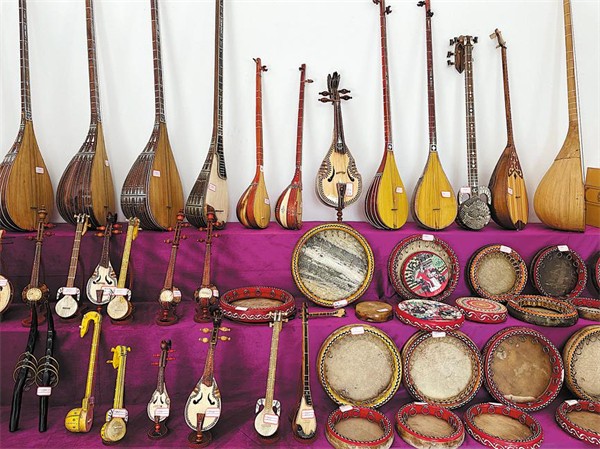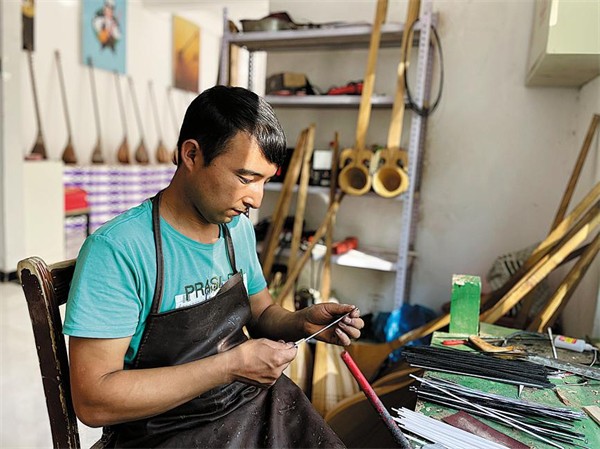Craftsmen strike a chord
![1683627806359004514.jpg The entrance of Jiayi village, Xinjiang Uygur autonomous region.[Photo by Xing Wen China Daily].jpg](http://subsites.chinadaily.com.cn/xinjiang/att/20230509/1683627806359004514.jpg)
The entrance of Jiayi village, Xinjiang Uygur autonomous region. [Photo by Xing Wen/China Daily]
At 25 meters tall and 56 meters wide, the loess statue — a man holding a rawap, a plucked Uygur instrument — stands proudly at the entrance of Jiayi village, Xinjiang Uygur autonomous region. The eye catching piece captures the characteristic features of the village.
The village, located in Xinhe county, Aksu prefecture, is renowned for the skill of its villagers in making traditional Uygur musical instruments, an art they have practiced for more than 300 years.
About 100 of the village's 326 households are engaged in making more than 50 different types of local ethnic musical instruments. Last year, the village's music industry recorded an annual output value of 18 million yuan ($2.8 million), with products sold all over China and even in Europe, South Korea, and Japan.
Mulberry wood is commonly used by Ayit Imin, 68, to make the traditional stringed instruments of the Uygur people, such as the tembur, satar and dutar.
"The wood has outstanding pliability, acoustic properties and natural durability," he says. "It can make a sensational sound."
Ayit, a fifth-generation instrument maker in his family, became a State-level inheritor of intangible cultural heritage nine years ago. That enables him to get an annual subsidy of 20,000 yuan from the government. This money allows inheritors like Ayit to pass on their instrument making skills.
The honor also helps to promote his reputation, as well as boost sales of the instruments he makes.
![1683627864014080484.jpg Many instruments hang from the grape trellis in the yard of Nurdun Ismayil, a young craftsman in Jiayi village.[Photo by Xing Wen China Daily].jpg](http://subsites.chinadaily.com.cn/xinjiang/att/20230509/1683627864014080484.jpg)
Many instruments hang from the grape trellis in the yard of Nurdun Ismayil, a young craftsman in Jiayi village. [Photo by Xing Wen/China Daily]
As one of the village's consummate instrument makers, Ayit is determined that more of his fellow villagers benefit from the craftsmanship.
He has offered free training to more than 200 people from Jiayi and nearby villages, and has tried to recruit more unemployed villagers to his cooperative to increase local employment.
He is also working on adapting some traditional Uygur instruments in order to make them easier to play.
"I believe that if it's easier for people to learn how to play the instruments, they are more likely to enjoy and relish them. That will help increase the popularity of traditional Uygur instruments and ensure they are passed down to future generations," says Ayit.

A display of some of Anwar Axim's products. [Photo by Xing Wen/China Daily]

Artisan Anwar Axim at his workshop in Towankursak village, Kashgar prefecture. [Photo by Xing Wen/China Daily]